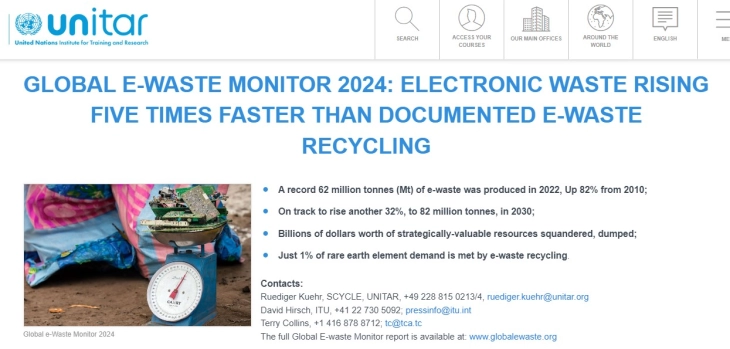UN study finds the world produces more e-waste every year
- The world is producing more and more e-waste, according to a new UN report, but recycling is not keeping up.

Geneva, 20 March 2024 (dpa/MIA) - The world is producing more and more e-waste, according to a new UN report, but recycling is not keeping up.
In 2022 alone, 62 million tons of electronic waste - defined as any device with a plug or batteries - will have been generated, according to the UN's Global E-Waste Monitor published on Wednesday.
This is a record - and an increase of 82% compared to 2010. If things continue at this rate, 82 million tonnes can be expected by 2030.
E-waste from 2022 could fill 1.55 million 40-ton lorries, the report said. Bumper to bumper, that lorry convoy would then extend roughly around the equator.
Recycling is lagging far behind in relation to the rapidly growing mountain of discarded mobile phones, laptops, televisions, fridges and other appliances. In 2022, less than a quarter (22.3%) of e-waste was documented as having been properly collected and processed, according to the report. This could fall to 20% by 2030, it said.
Billions of dollars worth of recoverable resources are being wasted, the report added. There are dangers for the environment because electronic waste can contain toxic additives and hazardous substances such as mercury, which should be disposed of and processed correctly.
"We are dealing with a massive imbalance," Rüdiger Kühr, one of the report's authors, told dpa. "This is largely due to the fact that in many parts of the world there is neither appropriate legislation nor infrastructure for collection and recycling. As a result, the materials do not enter the actual recycling process."
There are many reasons why new products soon become scrap. One of them is that they are often designed to make repairs extremely difficult, for example many devices are glued together instead of screwed, which makes it difficult to open without causing damage.







